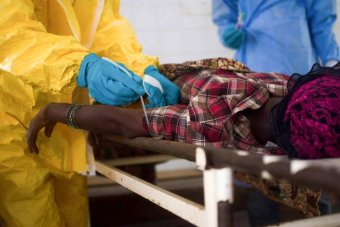The World Bank has announced a new program to mobilise funds quickly against virulent disease outbreaks after the world was caught unprepared in the 2014 Ebola disaster in West Africa.
World Bank president Jim Yong Kim said the new Pandemic Emergency Financing Facility (PEF) will accelerate global and national responses to disease outbreaks that threaten large populations and fragile economies.
He said the PEF, a combination of catastrophe insurance and bonds, is a direct reaction to the sluggish donor response to the outbreak of Ebola, which killed thousands and shut down economic activity for months.
“The recent Ebola crisis in West Africa was a tragedy that we were simply not prepared for. It was a wake-up call to the entire world,” Dr Kim said.
“We can’t change the speed of a hurricane or the magnitude of an earthquake, but we can change the trajectory of an outbreak.
“With enough money sent to the right place at the right time, we can save lives and protect economies.”
Funds flowed too slowly after Ebola hit
Dr Kim, a medical doctor and expert on health and disease in developing countries, put the World Bank in the lead of the response to Ebola at the time.
But he acknowledged that it took months to bring together the hundreds of millions of dollars needed to pay for deploying health personnel, supplies, and other relief to Sierra Leone, Guinea and Liberia.
The bank estimated that had the PEF existed in mid-2014, an initial $US100 million ($138 million) could have been mobilised as early as July of that year to severely limit the spread and severity of the epidemic.
Instead, it took three months for that scale of money to begin flowing, a period in which the number of Ebola cases increased ten-fold.
The disease eventually killed more than 11,300 people and cost at least $US10 billion — more than $US7 billion in international aid and some $US2.8 billion in gross domestic product losses in Guinea, Liberia and Sierra Leone.
G7 urged World Bank to develop faster response
Dr Kim announced the creation of the PEF at the gathering of G7 finance ministers in Sendai, Japan.
He said the group of global powers had pressed the World Bank last year to develop a quicker way for the world to respond to pandemics.
Dr Kim said Japan was the first to commit support for the PEF, with a $US50 million contribution.
The insurance will cover outbreaks of several classes of infectious diseases most at risk for epidemics, but that list does not include Zika, the deadly mosquito-borne virus spreading through the Americas.
But Dr Kim said the bank is also putting together a separate emergency “cash window” to address that and other outbreaks not covered.
Under the program the 77 least developed countries will be covered by the insurance.
Unlike common insurance that repays losses after a disaster, the PEF insurance is designed to release funds as soon as a disease outbreak reaches a certain level as defined by specific criteria.
Dr Kim said the World Bank has worked with insurers on the product, which will total $US500 million at first, and is confident the global financial markets will accept it.
AFP/Reuters

